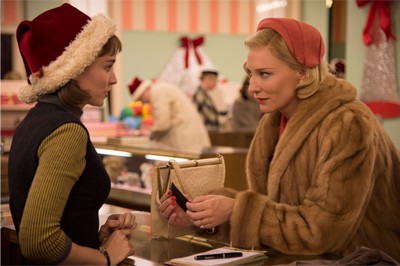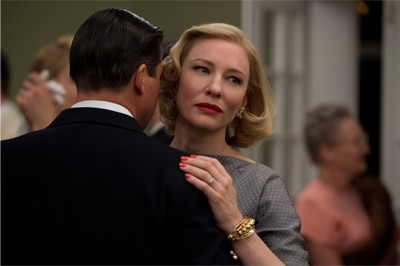| Reviews & Columns |
|
Reviews DVD TV on DVD Blu-ray 4K UHD International DVDs In Theaters Reviews by Studio Video Games Features Collector Series DVDs Easter Egg Database Interviews DVD Talk Radio Feature Articles Columns Anime Talk DVD Savant Horror DVDs The M.O.D. Squad Art House HD Talk Silent DVD
|
DVD Talk Forum |
|
|
| Resources |
|
DVD Price Search Customer Service #'s RCE Info Links |
|
Columns
|
|
|
Carol
The Weinstein Company // R // November 20, 2015
List Price: Unknown [Buy now and save at Fandango]

With a more progressive era comes more films and television shows that are willing to assimilate once suppressed narratives. This especially holds true for LGBT filmmaking, which has certainly had more of a platform to speak on ever since the fight for marriage equality truly made progress. It's absolutely great that we're finally able to see stories told from the perspective of individuals, other than straight white men. However, many of these LGBT features have come to have a formula of their own, which have become just as tired as any other stereotypical structure in media. Director Todd Haynes' Carol has been receiving an abundance of positive responses from across the festival circuit, although it felt like nothing more to me than the typical romantic drama.
Taking place in 1950s New York, Therese (Rooney Mara) is a department store clerk who dreams of becoming a photographer. With pressures from her boyfriend to travel and get married, she has no clue what she wants. Everything in her life changes when she meets an older, married woman by the name of Carol (Cate Blanchett).
Based upon a book titled The Price of Salt, Phyllis Nagy wrote the screenplay of this character piece. Carol aims to enchant audiences with its two leads and generate a plethora of emotions. While slightly hidden, it's actually a coming-of-age film that tells the story of a young woman coming to adulthood. She struggles to find her identity, as she has some difficulty with the idea of homosexuality and her feelings towards this particular older woman. Blatant symbolism and subtle character traits greatly express Therese's young and fragile nature and Carol's mature confidence in a way that is clear, but softly stated. We've seen this combination of personalities in countless dramatic romances, but the characters themselves are generally well-painted in a way that introduces us to their world rather well.
Unfortunately, the same can't be said about the overall movement of the story. Carol plays it extremely safe by following the plot beats of any "forbidden" dramatic romance. Without even seeing the film, any moviegoer could guess exactly how it plays out. This places it in the territory of being occasionally dull. Unlike films such as Blue is the Warmest Color, I felt absolutely no feelings towards Therese and Carol's relationship. We aren't given much of a reason to care, other than the fact that they're fighting an uphill battle against the heteronormative culture. Despite the strong initial character introductions, Carol relies on several melodramatic sub-plots that drag the overall film down. The custody battle that occurs between Carol and her husband escalates to over-the-top levels, which causes the feature to feel like it belongs more on a stage than it does on the silver screen.
Carol will undeniably be quoted by some of my colleagues as being an "LGBT triumph," but I contest that. Rather than the occasional scene, the film hardly explores the poor treatment that homosexuals received at that time. Therese's boyfriend's reaction to her asking about his opinion towards gay people is one of the extremely few sequences that displays this. In any heterosexual film, the noticeable age difference would have been called to attention, but it's practically ignored here. If the romance was as captivating as in various other LGBT films, I wouldn't mind this lack of attention to cultural detail. However, it holds its focus on a predictable romance and a sub-par framework.
Once the film debuted at Cannes Film Festival, critics and moviegoers alike instantly announced Cate Blanchett as an Oscar front-runner for Best Actress. She will almost certainly receive the nomination for her portrayal as the title character, although it's hardly the best performance of the year. It's refreshing to see Blanchett star in a more reserved role, which contrasts well with her brilliant, albeit "showy" work in Blue Jasmine. This is an inspired performance that fits the film well, but it's certainly being overstated. On the other hand, Rooney Mara is often subdued as Therese. She isn't given much of a chance to shine, as she simply doesn't receive as many big emotional moments as Blanchett. They're both fine by themselves, but the chemistry between the two of them is underwhelming. This is ultimately the reason why the emotion that so many have spoken of simply didn't reach me.
All of the praise coming from the major festivals around the world puts me in the minority for being underwhelmed by Carol. Most find the film to be massively impactful, but I saw a predictable dramatic romance that follows all of the same plot and character beats that we've come to expect. For a feature that some will call a triumph for LGBT filmmaking, it hardly explores homosexual-related issues in the 1950s. The overall atmosphere felt distanced due to Haynes' grainy and relatively dark-tinted picture, which makes even the most supposedly intimate scenes feel cold. While not a bad film, it's a disappointing picture that I had high hopes for. Carol is cold and ineffective in telling a story that we have seen plenty of times before. Rent it.

|
| Popular Reviews |
| Sponsored Links |
|
|
| Sponsored Links |
|
|
| Release List | Reviews | Shop | Newsletter | Forum | DVD Giveaways | Blu-Ray | Advertise |
|
Copyright 2024 DVDTalk.com All Rights Reserved. Legal Info, Privacy Policy, Terms of Use,
Manage Preferences,
Your Privacy Choices | |||||||











